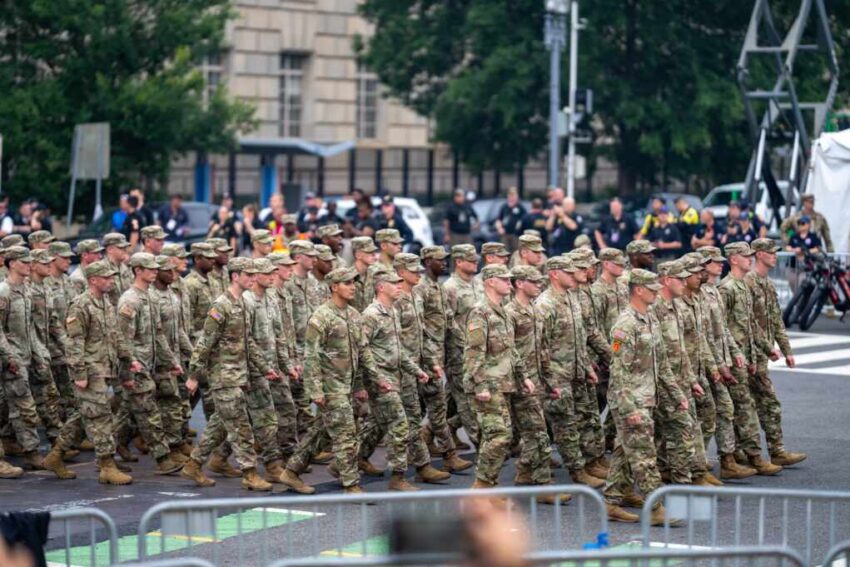A bold move to federalize D.C.’s local police raises constitutional questions, sparking nationwide debate.
Story Highlights
- President Trump federalized the D.C. Metro Police and deployed the National Guard.
- Trump claims significant crime reductions, positioning this as a key election issue.
- Federal intervention in local policing is rare and controversial.
- Critics argue this move sets a dangerous legal and political precedent.
Trump’s Bold Move to Combat Crime
In an unusual use of presidential authority, Donald Trump announced the deployment of the D.C. National Guard and temporary federal oversight of law enforcement coordination in Washington, according to a White House statement. Legal experts, including Professor Stephen Vladeck of the University of Texas School of Law, note that while presidents control the D.C. National Guard, direct federalization of the Metropolitan Police Department is rare and legally contested. This unprecedented move is part of a 12-day initiative aimed at reducing crime rates in the nation’s capital. Trump has positioned himself as a law-and-order candidate, highlighting this action as a significant achievement in combating urban crime.
Trump’s strategy, which he described as a direct federal role in local policing, is highly unusual. Prof. Lindsay Cohn from U.S. Naval War College, an expert on civil-military relations, explains that federal intervention is generally reserved for riots, insurrections, or emergencies, not routine crime reduction. Typically, such interventions are reserved for extraordinary crises, not routine crime reduction. The deployment of the National Guard for domestic policing, rather than emergency response, marks a shift in the traditional role of military forces in civilian law enforcement.
Controversy and Criticism
Critics argue that Trump’s actions push legal boundaries and could set a harmful precedent. Retired Maj. Gen. Randy Manner, a former deputy director of the Joint Staff, told The Washington Post that deploying the Guard for routine crime reduction raises questions of necessity and legality. He and other security analysts caution that such actions blur the line between civilian law enforcement and military support. They warn that the militarization of local law enforcement erodes civil liberties and challenges the balance between federal and local authority.
Despite the controversy, Trump has claimed the initiative produced sharp reductions in robbery (46%), carjacking (83%), and violent crime (22%). These figures have not yet been independently verified by the D.C. Metropolitan Police Department or the FBI’s Uniform Crime Reporting program, leaving questions about their accuracy. However, these figures have yet to be independently verified, raising questions about their accuracy and the effectiveness of the federal intervention.
Implications for the 2026 Election and Beyond
The move to federalize D.C.’s police forces is central to Trump’s 2026 campaign narrative. By framing crime reduction as a measurable success, he aims to draw a sharp contrast with previous administrations. According to Dr. Charles Ramsey, former D.C. police chief and senior fellow at the Council on Criminal Justice, the move could influence how other cities debate federal involvement in crime reduction and fuel broader political arguments about policing and public safety.
Trump claims ‘we’re against crime. Democrats like crime’ https://t.co/n4ExZL9MYK
— Observing Time
(@TimeObserving) August 26, 2025
However, the long-term implications remain uncertain. Legal scholars, such as Prof. Mary Cheh from George Washington University Law School, suggests that the policy could invite constitutional challenges and complicate civil-military relations, potentially shaping future governance debates. As the 2026 election approaches, Trump’s bold actions continue to provoke discussion and debate among conservatives and liberals alike.
Sources:
Trump’s Calls for Guard Units Tasked to Quell Civil Unrest
President Donald J. Trump Takes Additional Measures to Address the Crime Emergency in the District of Columbia
Click this link for the original source of this article.
Author: Editor
This content is courtesy of, and owned and copyrighted by, https://conservativeamericatoday.com and its author. This content is made available by use of the public RSS feed offered by the host site and is used for educational purposes only. If you are the author or represent the host site and would like this content removed now and in the future, please contact USSANews.com using the email address in the Contact page found in the website menu.





